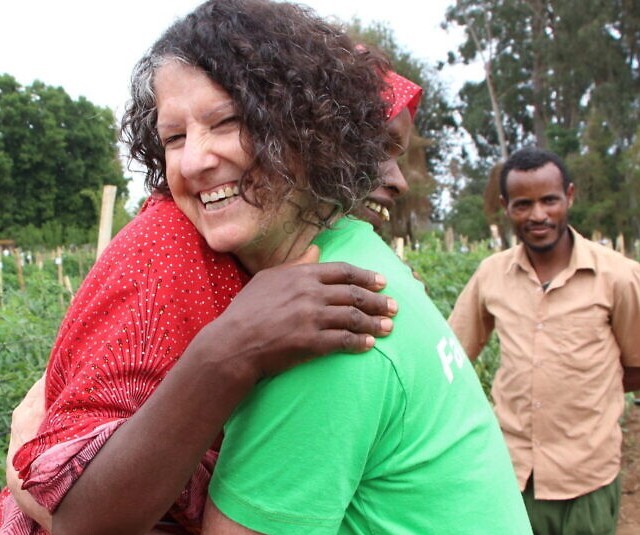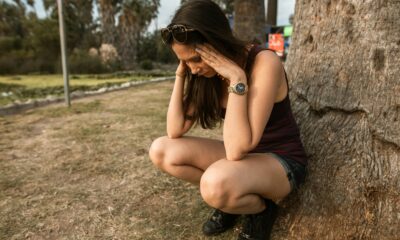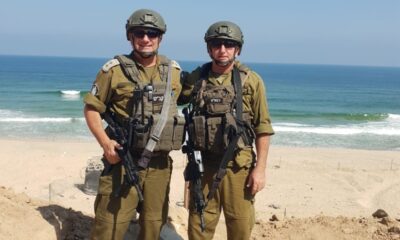
Banner

Hostage brought seeds of hope to Africa
One of the 239 Israelis taken hostage by Hamas on 7 October, Dr Shoshan Haran, was in Cape Town in June this year attending an international seed conference, part of her work that has changed the lives of rural farmers in Ethiopia, Rwanda, and Tanzania.
Viv Anstey, a Cape Town Jewish community leader, met Haran when she and Dr Alon Haberfeld were in South Africa. “Shoshan has been taken hostage with seven of her family members. Her husband, sister, and other family members were killed on the day of the attack [on 7 October] at Kibbutz Be’eri,” says Anstey.
“Shoshan, aged 67, and a beloved mother and grandmother, is the founder of Fair Planet, which has changed the lives of rural African farmers by supplying them with good quality seeds. This is a story of impact and dedication in Africa that needs to be told.”
Haran’s Fair Planet is an internationally acclaimed farming project that over the past decade has enabled tens of thousands of previously impoverished farmers to earn a good living while providing an estimated one million Africans with a reliable source of food. Now, with Haran being held hostage, the project – along with her life – is suddenly in jeopardy. With South Africa being a member state of the African Union (AU), Anstey hopes that Haran’s impact in Africa can be conveyed to that body through our government, and that the AU could possibly play a role in getting her released.
“We’re taught ‘Whoever saves a life, it’s as though he had saved the entire world,’” says Anstey. In Haran’s case, this can be taken literally, as many saw her work as saving the planet, one seed at a time.
After meeting Haran in Cape Town, Anstey planted the seed of an idea that Fair Planet’s impact could be expanded to South Africa and South African Jewry could support this revolutionary work being done on our continent. Now, this is in limbo as Haran is held hostage along with her daughter, Adi Shoham, son-in-law Tal Shoham, grandchildren Yahel and Naveh, sister Lilach Kipnis, her sister-in-law, Sharon Avigdori, and her daughter, Noam.
“Everything we do is aimed at the success of smallholder farmers in developing countries,” says Dr Haberfeld, who is also spending every waking moment working towards Haran’s release. “People in Africa are trapped in a vicious cycle of poverty and hunger. Fair Planet seeks to provide them with food security and economic opportunities by making high-quality vegetable seeds suitable to local conditions accessible and affordable to local farmers. We bridge the gap between existing high-quality seed varieties developed by leading seed companies and transfer technologies and know-how to smallholder farmers in Africa.”
It all started with Haran. After studying plant biology at the Hebrew University of Jerusalem and Rutgers University in New Jersey, she built a successful career at a leading seed producer. “She could have easily stayed – she had a well-paying job with lots of trips to Europe and other perks,” said her brother, Aviv Havron. “But something inside of her wanted to do something more.”
Hybrid seeds that earn seed companies hundreds of millions of dollars a year in Western markets are adapted to the soil and climate conditions of specific regions in the Western world. However, “no-one was developing seeds for the farmers of Africa,” said Haran in a film about her work, pointing out that there are years when pests wipe out the entire crop of many farmers. “Even in good years, the seeds gathered at the end of the growing season offer low yields.”
In 2011, Haran took a risk by quitting, and together with Haberfeld, a seed expert, founded Fair Planet. Their idea was simple and ingenious. “Farmers already know how to grow crops. They just don’t have high-quality seeds,” said Haran, noting that the seed with the potential to benefit African farmers already existed. The challenge was to see which ones would suit a specific African region. Over a period of two years, Haran and her team patiently experimented with numerous seed varieties until they found the type that best suited Butajira, a region in central Ethiopia.
A pilot project involving 20 tomato farmers was started. The results of the first season’s crop were dramatic. The farmers’ tomato yield increased an average five-fold, and they could sell their tomatoes at a higher price because they lasted longer without spoiling.
“By using better vegetable seeds, local farmers can increase their yield more than three times,” says Haberfeld. “Daily income for a smallholder farmer is about $1.50 [R27.50]. Their land is used for subsistence farming, but climate change and outbreaks of pests threaten their survival. More than seven million people suffer from malnutrition in Ethiopia alone. However, locally produced vegetables allow farmers to benefit from improved nutrition. From producing high-quality vegetables in only one season on a small plot of 1 000 square meters, smallholder farmers can generate profit that increases their household’s annual income by 26%.
“When I met Shoshan, my impression was of the most down-to-earth person – literally,” says Anstey. “She’s the kind of person who is always happy to get her hands dirty and find a solution to a problem. When we met, they were mainly fundraising in Europe, but their beneficiaries were in Africa, so I thought it would be helpful if the South African Jewish community could get involved. Her work supports millions of Muslim and black farmers, and now their livelihoods are also on the line. With South Africa being part of the AU, what’s our role here – how can we help?”
Anstey says she, her husband, and son took a sabbatical in Uganda, Tanzania ,and Kenya some years ago, and Haran’s work reminded her of that time and South African Jewry’s connection to the wider African continent.
When she heard Haran had been taken captive, she was “devastated”. But instead of feeling helpless, she hopes to share Haran’s story and her vital role in uplifting humanity. “Her work and organisation are rudderless. We feel so far away and so removed, but we’re actually so close to this story, and we have a role to play – whether it’s conveying Shoshan’s story to our government and in turn the AU, or contributing to her work.”
Haran has German citizenship, and her great-grandmother was killed in Theresienstadt in 1942. Her ancestors came to Israel to build it as a place of safety for Jews. Now, the nightmare they experienced at the hands of the Nazis is echoing down the generations. Haran, who symbolises the strength, resilience, and generosity of Israel, is being held captive by a ruthless, heartless enemy. Anstey hopes that this time, Haran and the other hostages can be saved, returning her to a world that so desperately needs her wisdom.










